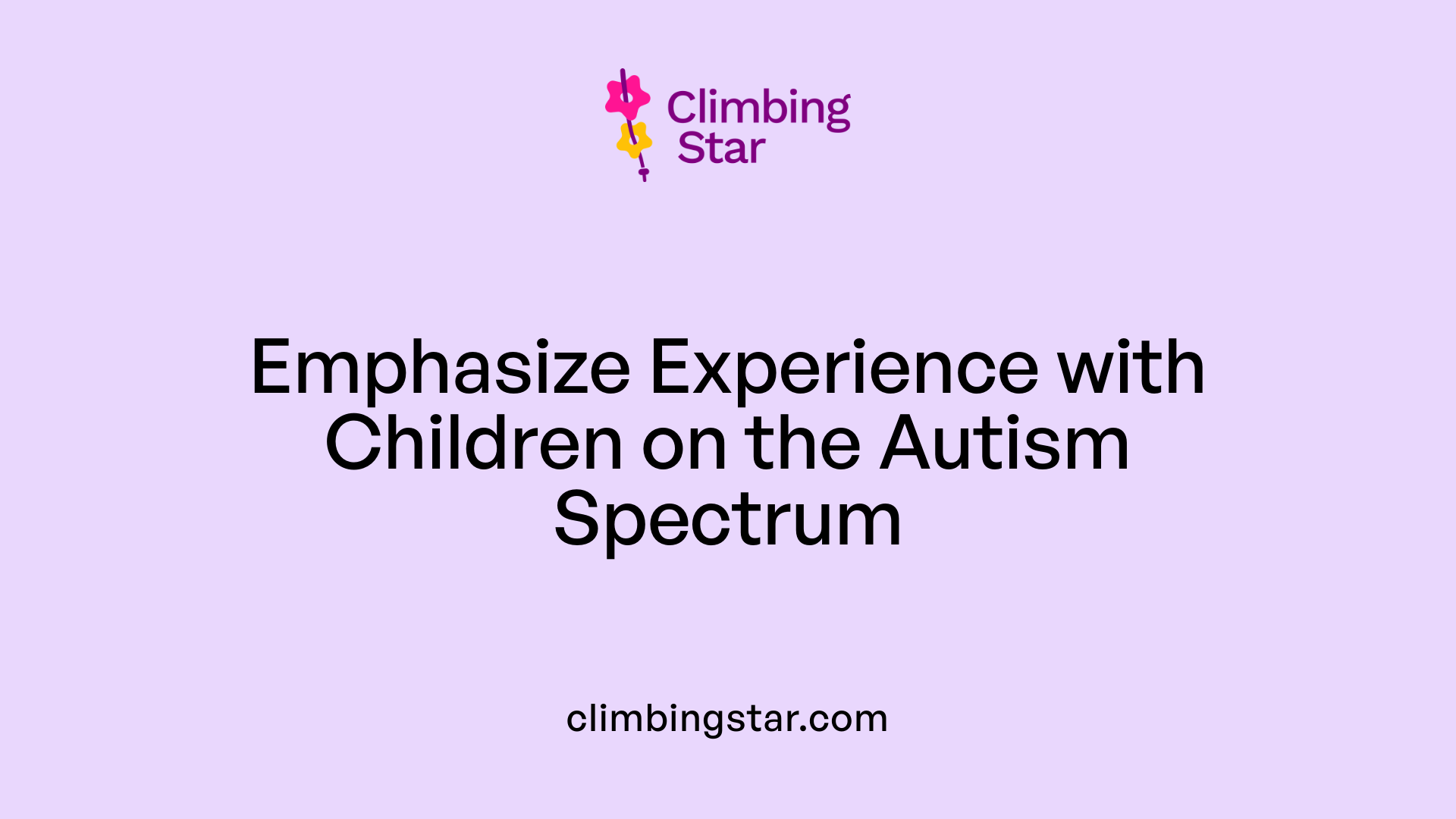

A strong cover letter can significantly enhance your chances of securing a Registered Behavior Technician (RBT) role. This document not only introduces you to potential employers but also highlights your relevant skills, certifications, and dedication to supporting clients with developmental disabilities. Given the competitive nature of ABA therapy roles, tailoring your cover letter to reflect the specific requirements of the position is essential. This article provides comprehensive guidance, examples, and typified best practices to help you craft an impactful RBT cover letter.
 When applying for a Registered Behavior Technician (RBT) position, your cover letter should effectively showcase your understanding of Applied Behavior Analysis (ABA) principles and your experience in managing behavior. Highlight your ability to implement behavior plans systematically, collect and analyze data, and adjust interventions based on client progress.
When applying for a Registered Behavior Technician (RBT) position, your cover letter should effectively showcase your understanding of Applied Behavior Analysis (ABA) principles and your experience in managing behavior. Highlight your ability to implement behavior plans systematically, collect and analyze data, and adjust interventions based on client progress.
Experience working with children on the autism spectrum and other developmental or behavioral disorders is crucial. Make sure to detail your hands-on experience in providing both one-on-one and group behavioral interventions, emphasizing how your efforts have supported individual progress.
Your familiarity with executing behavior intervention plans and accurately collecting data to monitor outcomes also plays a vital role. Employers value candidates who can demonstrate that their interventions lead to tangible improvements, supported by measurable results.
Collaboration skills with clinical teams and supervisors are essential. Share examples of how you've coordinated with multidisciplinary teams, participated in assessments, and incorporated feedback into your practice.
Using these strategies in your cover letter will help demonstrate your capabilities and alignment with the role, increasing your chances of securing an interview.
| Aspect | What to Highlight | Additional Tips |
|---|---|---|
| ABA Principles | Knowledge of behavior management & intervention strategies | Mention specific techniques used and their outcomes |
| Client Experience | Hands-on work with children with autism | Use examples of interventions and measurable results |
| Data Collection | Skills in implementing and analyzing behavioral data | Talk about tools or software used |
| Team Collaboration | Working with clinical teams & supervisors | Share experiences of teamwork and interdisciplinary coordination |
Are there any templates or examples of cover letters for RBT positions?
Yes, many templates and sample cover letters are available online to aid applicants applying for Registered Behavior Technician roles. These resources serve as useful starting points, offering guidance on structuring an effective letter.
Effective RBT cover letters typically include a few essential components. They start with a personalized introduction that expresses enthusiasm for the position and briefly outlines relevant qualifications. The body of the letter highlights specific ABA-related skills, such as implementing behavior plans, collecting data accurately, and applying Applied Behavior Analysis techniques. It's also beneficial to mention soft skills like communication, patience, empathy, and teamwork, as these qualities greatly contribute to providing quality care.
Furthermore, a strong cover letter should demonstrate understanding of the organization’s mission and values, illustrating how the applicant’s background aligns with the role. Emphasizing achievements or experiences that resulted in positive impacts for clients can make the letter stand out.
When structuring the letter, consider an enthusiastic yet professional tone. Open with a compelling introduction, detail your relevant experience and motivation in the middle, and conclude with a call to action expressing eagerness to discuss your application further.
Using available templates can streamline the application process, ensuring all important points are addressed. Customizing these samples to reflect your unique background and the specific organization’s needs increases your chances of making a memorable impression. Remember, a well-crafted, genuine cover letter combining professionalism with passion can significantly improve your prospects of securing an interview in the competitive ABA field.

When preparing a cover letter for a Registered Behavior Technician (RBT) position, proper formatting and structure are essential to make a strong impression. Start with a professional header that clearly displays your contact information, including your full name, email address, phone number, and if applicable, your LinkedIn profile. This ensures the employer can easily reach you.
Begin your letter with a personalized greeting, addressing the hiring manager by name if possible. Follow this with a compelling introduction that states your interest in the role, mentioning your RBT certification and relevant experience in Applied Behavior Analysis (ABA) therapy. Highlight your passion for supporting individuals with Autism Spectrum Disorder (ASD) and developmental disorders.
The body of your letter is where you detail your skills, accomplishments, and experience. Focus on specific examples of your work, such as implementing behavior protocols, conducting skills training, and collecting data. Emphasize your ability to work under supervision, collaborate with teams, and adapt interventions based on individual needs. Tailoring these details to align with the job description strengthens your application.
Conclude with a concise closing paragraph that reinforces your enthusiasm for the position. Summarize why you are a good fit, express your desire for an interview, and thank the employer for considering your application.
Overall, aim for a one-page letter using a clear, professional font. Maintain error-free writing, customize each application for the organization, and ensure your tone remains positive and confident. Following these best practices increases your chances of standing out as a qualified candidate.
 When applying for a position as a Registered Behavior Technician (RBT), it's crucial to understand the specific responsibilities and qualifications associated with the role. This understanding helps you craft a focused and compelling cover letter that aligns your skills with the needs of the employer.
When applying for a position as a Registered Behavior Technician (RBT), it's crucial to understand the specific responsibilities and qualifications associated with the role. This understanding helps you craft a focused and compelling cover letter that aligns your skills with the needs of the employer.
The RBT is responsible for implementing ABA treatment plans, conducting skills training, collecting data, and modeling procedures. Typically, RBTs work directly with children with Autism Spectrum Disorder (ASD) and other developmental or behavioral disorders. The role often involves providing one-on-one and group behavioral interventions, supporting assessments, and collaborating with a clinical team.
Qualifications usually include a high school diploma, RBT certification through the Behavior Analyst Certification Board (BACB), and relevant experience working with children with disabilities. Some positions, especially those requiring more advanced responsibilities, may prefer candidates with a bachelor's degree, experience in crisis management, bilingual skills, or current enrollment in a master's program.
Understanding these responsibilities allows applicants to highlight their relevant training, experience, and achievements. For instance, if you have successfully implemented behavior intervention plans or have prior experience working with children on the autism spectrum, these should be prominently featured. Additionally, demonstrating familiarity with data collection and modeling techniques reassures employers of your capability to perform essential duties.
By tailoring your cover letter to reflect these specific requirements, you demonstrate not only your qualifications but also your genuine interest in and understanding of the role. This targeted approach increases your chances of standing out among other candidates and securing an interview.
Summary Table of RBT Role Expectations and Application Focus:
| Aspect | Details | How to Highlight in Cover Letter |
|---|---|---|
| Implementation of ABA Plans | Execute behavior reduction and skill acquisition programs | Mention relevant training, successful plan implementations, and outcomes |
| Supervision & Teamwork | Report to licensed supervisors, collaborate with clinical teams | Emphasize communication skills and teamwork experience |
| Client Populations | Children with Autism and developmental disorders | Showcase experience working with these groups |
| Qualifications | High school diploma, BACB certification, experience | List certifications, education, and practical experience |
| Responsibilities | Data collection, modeling, direct care | Highlight your data skills, ability to model procedures, and direct intervention success |
Understanding these elements ensures a focused, personalized cover letter that effectively communicates your fit and enthusiasm for the RBT position. Tailoring your application in this way demonstrates your readiness to contribute meaningfully to the organization’s goals.
When applying for an RBT position, personalized cover letters can make a significant difference in catching the employer's attention. Spend time carefully reviewing the job posting to identify the essential skills and qualifications the organization seeks. For instance, if the role emphasizes experience with children on the autism spectrum or proficiency in crisis management, highlight your relevant practical experience and certifications like your RBT credential.
Showcase your background working with children and adolescents with behavioral or developmental disabilities to demonstrate your passion and dedication. Mention specific achievements or situations where your intervention skills produced measurable results. Using sample cover letters as a guide can help structure your own document, ensuring it includes a professional header, a compelling introduction, a body that emphasizes your relevant skills, and a strong closing.
Personalization is crucial. Address the letter to the hiring manager if possible, and tailor each paragraph to reflect how your experiences align with the specific role and organization’s values. For example, if the employer emphasizes collaboration or confidentiality, provide evidence of your ability to work well within a team and respect client privacy.
Thorough proofreading is also essential. An error-free letter presents you as a meticulous and professional candidate. Incorporate current technological tools, such as AI-based cover letter generators, to help craft personalized content efficiently. Overall, a tailored approach that aligns your expertise with the job requirements and shows genuine motivation will greatly enhance your application’s impact.
Crafting an effective RBT cover letter requires careful attention to detail, a clear understanding of the role’s demands, and a personalized approach that highlights your unique qualifications and passion for behavioral therapy. Use the best practices outlined here, incorporate quantifiable achievements, and tailor your letter to resonate with the specific organization. Remember that a well-structured, error-free, and enthusiastic cover letter not only showcases your professionalism but also significantly increases your chances of landing an interview in this competitive field. Stay genuine, and let your dedication to making a difference shine through.




We'll call you at your convenience.